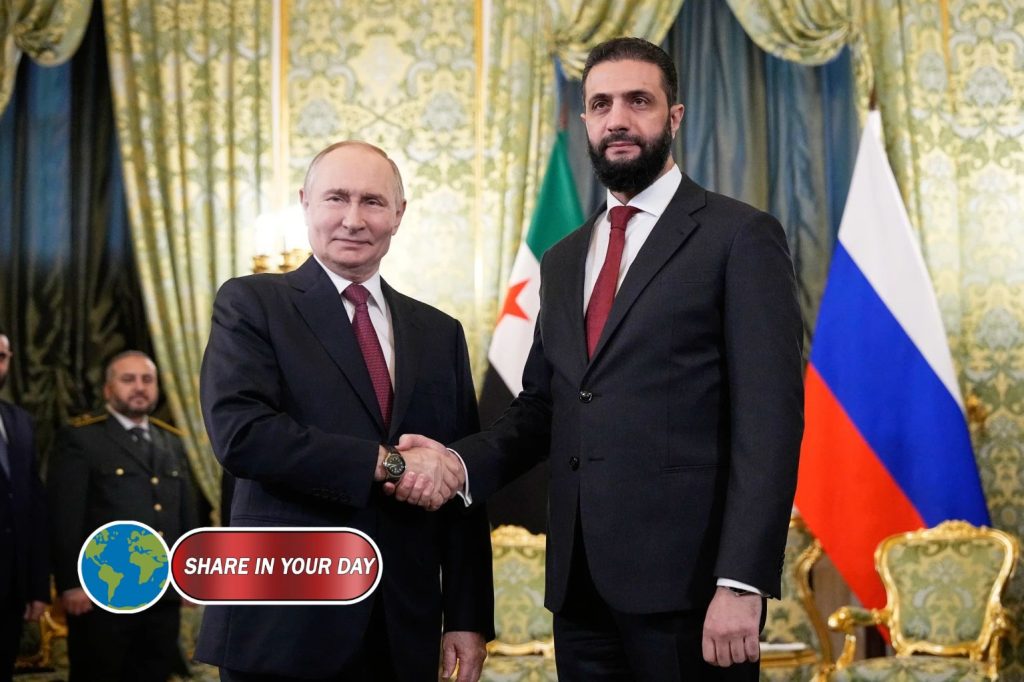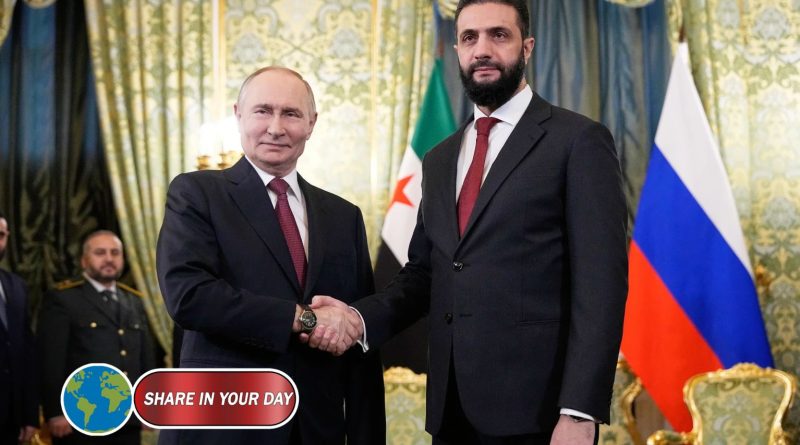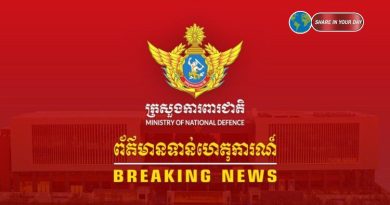Syria’s Interim Leader Ahmad al-Sharaa Meets Putin in Moscow
MOSCOW
Syria’s interim leader, Ahmad al-Sharaa, held his first official talks in Moscow on Wednesday, marking a significant diplomatic milestone after last year’s rapid uprising that ousted former President Bashar Assad.
Welcoming al-Sharaa at the Kremlin, Russian President Vladimir Putin emphasized the “historic ties” between Moscow and Damascus, voicing optimism about rebuilding and expanding bilateral relations. The meeting underscored Russia’s intention to secure its long-term strategic and military foothold in Syria despite the dramatic political changes in Damascus.

Rebuilding Relations After Assad’s Fall
The visit represents a delicate balancing act for both countries. Assad, long considered one of Moscow’s closest Middle Eastern allies, was granted asylum in Russia after fleeing Syria in December following a swift rebel offensive.
During the civil war, Russia’s military intervention—particularly through its air power—had decisively turned the tide in Assad’s favor, helping him retain control for over a decade. But as Moscow became increasingly preoccupied with its conflict in Ukraine, its military presence in Syria dwindled, leaving a vacuum that al-Sharaa’s forces capitalized on.
Despite once being on opposing sides, Syria’s new leadership has taken a pragmatic stance toward Moscow. Analysts say al-Sharaa’s visit is aimed at ensuring stability and maintaining Russian investment and expertise, particularly in the energy and infrastructure sectors.
Military and Economic Cooperation on the Table
Kremlin spokesperson Dmitry Peskov confirmed that the future of Russia’s military bases in Syria was a key topic during the talks. Russia maintains naval and air bases on Syria’s Mediterranean coast — its only military outposts outside the former Soviet Union.
According to Syria’s state news agency SANA, discussions also covered “regional and international developments of mutual interest” and explored ways to “develop cooperation to serve common interests.”
While al-Sharaa avoided mentioning the bases in his opening remarks, he acknowledged the importance of redefining bilateral relations.
“We are trying to restore and define in a new way the nature of this relationship,” he said, emphasizing Syria’s continued reliance on Russian production and expertise, particularly in the energy sector.
Putin, in turn, hailed Syria’s recent parliamentary elections as a “big success,” calling them a crucial step toward consolidating the country’s internal stability.
Russia’s Strategic Stakes in the Middle East
For Moscow, maintaining a foothold in Syria is vital for preserving its influence in the Middle East. The Kremlin has long viewed its bases at Tartus and Hmeimim as essential to projecting power in the Mediterranean.
“Syria remains a strategic partner for Russia,” political analyst Yevgeny Buzhinsky told local media. “Despite leadership changes, Moscow will not easily give up its military presence or its influence in the region.”
Foreign Minister Sergey Lavrov, speaking earlier this week, said Moscow’s decision to offer asylum to Assad was based purely on humanitarian grounds. He dismissed recent rumors about Assad’s health, stating that the former president “has no issues living in Moscow, and there have been no poisonings.”
Al-Sharaa’s Balancing Act
In a recent interview with CBS’s 60 Minutes, al-Sharaa said his government intends to pursue “all legal means” to demand the trial of Assad, whom he accused of leading a campaign of repression and corruption.
At the same time, the new Syrian administration sees continued cooperation with Russia as critical for rebuilding a war-torn economy. Russian oil shipments have reportedly resumed to Syria, and bilateral trade talks are underway.
For al-Sharaa, maintaining ties with Moscow offers a way to diversify Syria’s foreign policy while keeping long-standing partnerships intact. For Putin, it ensures that Russia retains influence in one of the Middle East’s most strategically valuable regions — even in the post-Assad era.
Looking Ahead
Russia had initially planned to host a Russia-Arab summit this week, but Putin postponed it to avoid disrupting ongoing ceasefire efforts in Gaza brokered by U.S. President Donald Trump.
Analysts say the postponement underscores Moscow’s broader diplomatic balancing act — managing its relationships with regional players while protecting its military and economic interests in Syria.
As both nations move forward, Wednesday’s meeting signals a cautious but determined effort to redefine a partnership that has survived war, upheaval, and shifting alliances — and now seeks a new footing in an uncertain Middle East.




